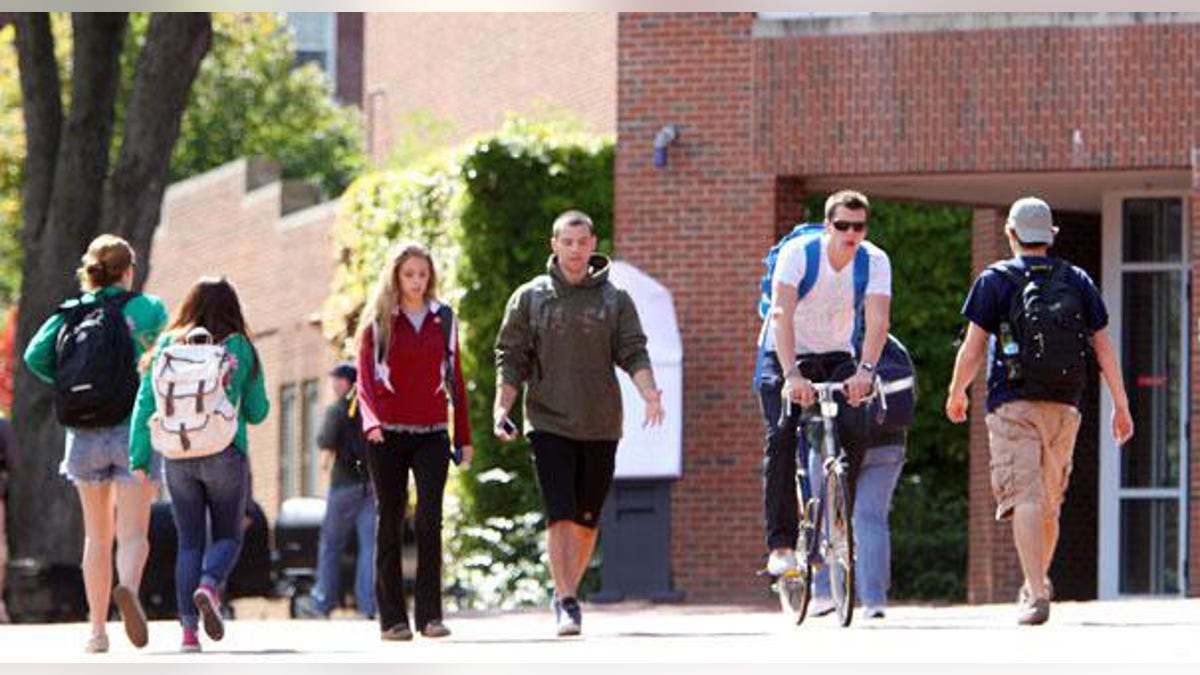
Students are pictured walking through a college campus. (AP)
States and colleges are trying to learn more about the extent of sexual assaults on campuses, following a renewed White House call to end such violence that argues one in five women have been victims of attacks.
In Maryland, the General Assembly is considering a bill that would require state colleges and universities to administer anonymous surveys on sexual assaults to create a clearer picture on the number of such incidents on campuses.
The bill sponsor, Delegate Jon S. Cardin, a Baltimore County Democrat, says the number of such assaults has reached “epidemic” proportions.
Earlier this week, the University of Virginia hosted a conference on the issue that attracted college officials and students from across the country.
The sold-out conference, which organizers called the first of its kind, came a month after President Obama announced the formation of The White House Task Force to Protect Students from Sexual Assault and roughly three years after his administration issued revised guidelines for institutions of higher education dealing with rape and other incidents of sexual assault and misconduct.
“Every university was struggling on its own to try and figure out how to handle this problem,” University of Virginia President Teresa Sullivan told National Public Radio. “If we at least share ideas with each other, we've got a better chance of coming up with a good solution.”
Among the concerns at the conference were the impact of drinking, the so-called “hooking up” culture and whether colleges were doing enough to encourage victims to file complaints.
Participants also argued that victims and others impacted by sexual assault are going outside university systems to detail their concerns and experiences on social media, which has sparked calls for change beyond the president’s recent efforts including a task force report within 90 days.
“Victims have not been taken seriously, and I think they're finally just tired of it,” Princeton Vice Provost Michele Minter told NPR.
Despite arguments that the focus should be on attackers, not college culture, panel guest Linda Fairstein, a lawyer and expert on violent crimes against women, told those in attendance that cases involving alcohol often present a problem in the legal system because they cloud the memory of those involved.
The renewed White House call is part of Obama’s larger effort to end sexual assault in this country against men and women.
The president in announcing the task force January 22 said higher education institutions have made strides in recent years to curb such violence.
However, reports also show "institutions' compliance with these federal laws is uneven and, in too many cases, inadequate,” he said.
Obama in announcing the task force and requesting the report said the institutions also must adopt and publish grievance procedures that provide for “the prompt and equitable resolution” of rape and sexual assault complaints. The institutions also must investigate reports of such incidents and take swift action to prevent their recurrence and provide victims with information on how to access the necessary support and services they need.
“I’ve got your back,” the president said to college students.
Colleges are required under federal law to collect and share information about such crimes. But the White House report shows just 12 percent formally report them. Among the contributing factors are self-blame and lack of understanding about sexual assaults and available resources, the report also found.
Schools are also taking other steps before the release of the task force report.
Swathmore College, a small liberal arts college in Pennsylvania, is rewriting its polices on sexual misconduct and is considering a change to its hearing process for sexual assault cases – not requiring the victim to be in the same room as the alleged attacker.
Capitol News Service contributed to this report.




